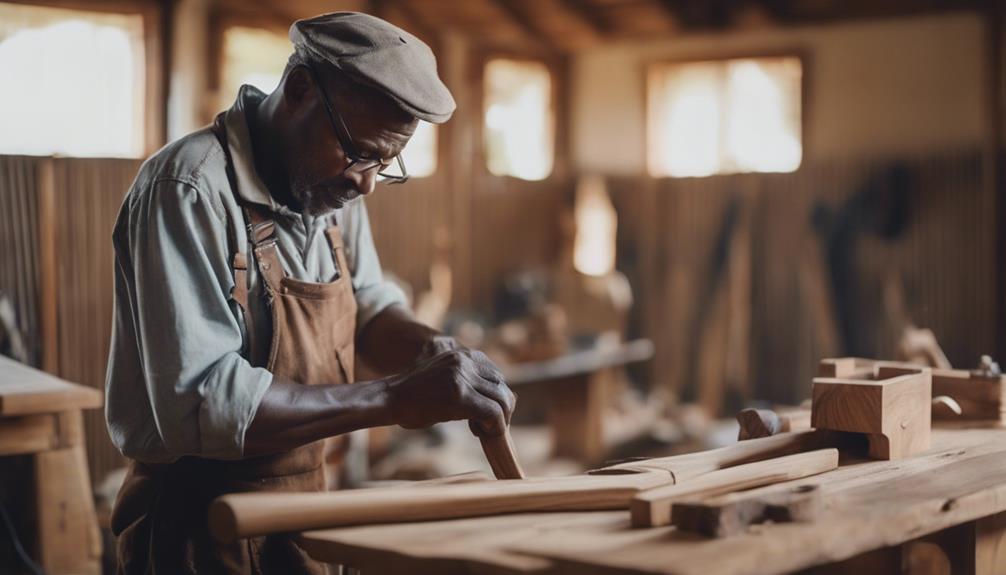When it comes to sustainable wood joinery practices in South Africa, it is crucial to embrace the use of locally sourced materials and traditional techniques.
By incorporating eco-conscious methods and placing emphasis on the longevity and strength of wood joints, artisans can craft not only enduring pieces but also contribute to the preservation of the environment.
In a region brimming with diverse wood species and a rich heritage of craftsmanship, mastering sustainable wood joinery is key to producing pieces that endure the test of time.
Key Takeaways
How can sustainable wood joinery in South Africa be achieved through wood selection, eco-friendly methods, traditional techniques, and craftsmanship? By choosing the right wood, adopting green practices, using traditional joinery methods, and prioritising sustainability, artisans can create durable, beautiful, and environmentally friendly joinery pieces. Contact Holzfleck for expert guidance and start your sustainable wood joinery project today to bring natural elegance to your space.
Choosing Sustainable Wood Types
Selecting Sustainable Wood Types
When embarking on wood joinery projects in South Africa, the selection of sustainable wood types plays a pivotal role in promoting environmental stewardship and supporting responsible forestry practices. Opting for African wood species like Yellowwood or Stinkwood not only showcases the beauty of indigenous resources but also contributes to environmentally friendly practices. By choosing wood from certified sustainable sources such as the Forest Stewardship Council (FSC), craftsmen ensure that the wood used in their projects has been harvested following strict guidelines that prioritise the long-term health of forests.
Moreover, considering reclaimed or salvaged wood for joinery projects can significantly reduce the environmental impact by giving new life to materials that would otherwise go to waste. Prioritising abundant and locally sourced wood not only supports the local economy but also helps in reducing the carbon footprint associated with transportation. When selecting wood, it is essential to opt for species treated with eco-friendly finishes and adhesives, further minimising environmental harm and ensuring that the final product aligns with sustainable practices.
Implementing Eco-Friendly Joinery Techniques
Implementing Eco-Friendly Joinery Techniques
Implementing eco-friendly joinery techniques involves utilising sustainable materials and practices to reduce environmental impact while creating high-quality woodwork. To achieve this, it is crucial to use locally sourced sustainably harvested wood, ensuring that forests are managed responsibly.
Opting for water-based, non-toxic adhesives and finishes not only promotes a healthier working environment but also minimises harm to ecosystems. Minimising waste is another key aspect of eco-friendly joinery; this can be achieved by carefully planning cuts to maximise the use of materials and by repurposing offcuts in other projects.
Additionally, exploring renewable energy sources to power woodworking tools can further enhance sustainability efforts in the workshop. Joining woodworking associations that promote sustainable practices can provide valuable guidance and support, connecting craftsmen with like-minded individuals striving for eco-conscious woodworking practices.
Embracing Traditional Joinery Methods
Embracing Traditional Joinery Methods
Drawing upon centuries-old practices and techniques, the art of embracing traditional joinery methods in South Africa showcases a rich heritage of craftsmanship and meticulous attention to detail.
Traditional joinery techniques in South Africa often involve the use of indigenous wood species like Yellowwood, Stinkwood, and Ironwood, which not only adds to the aesthetic appeal of the final piece but also contributes to the preservation of local forests. By utilising wood species that are abundant in the region, artisans can reduce the environmental impact of their work and promote sustainable forestry practices.
Moreover, traditional joinery methods prioritise durability and longevity, resulting in handcrafted pieces that stand the test of time. These techniques require a high level of skill, patience, and precision, with artisans dedicating years to mastering the craft.
The emphasis on traditional joinery not only honours the cultural heritage of South Africa but also ensures that each piece tells a story of tradition and excellence.
Enhancing Craftsmanship With Sustainable Practices
Continuing the legacy of traditional joinery methods rooted in South Africa's rich heritage, the current focus shifts towards enhancing craftsmanship through the integration of sustainable practices. By incorporating locally sourced and certified sustainable wood, artisans can significantly reduce the environmental impact of their creations. Implementing joinery techniques that minimise waste and promote the longevity of wood products not only showcases skill but also contributes to a more eco-conscious approach in woodworking.
Moreover, the use of eco-friendly finishes and adhesives plays a crucial role in ensuring sustainability throughout the crafting process. These finishes not only protect the wood but also safeguard the environment from harmful chemicals. Exploring traditional joinery methods that have stood the test of time for their durability and eco-conscious practices can inspire contemporary artisans to blend heritage with modern sustainability.
Educating oneself on sustainable wood practices is pivotal in contributing to a greener future in carpentry and woodworking. By staying informed and implementing these practices, craftsmen can elevate their work to not only reflect skill and artistry but also a commitment to preserving the environment for generations to come.
Showcasing Sustainable Wood Joinery Works
Showcasing the meticulous craftsmanship and sustainable ethos inherent in each piece, our sustainable wood joinery works exemplify a harmonious blend of artistry and environmental responsibility. By utilising eco-friendly finishes and adhesives, we ensure that our joinery projects not only stand out aesthetically but also contribute positively to the environment. The use of certified wood from sustainable sources underscores our commitment to responsible forestry practices, promoting the longevity of forests for future generations.
To provide a glimpse into our environmentally conscious practices, we showcase the energy-efficient tools and techniques employed in our sustainable wood joinery. Through the integration of these methods, we reduce waste and minimise our carbon footprint while delivering high-quality, eco-conscious creations. Leveraging social media and online platforms, we actively promote and exhibit our sustainable wood joinery works, engaging with a community that values craftsmanship and sustainability.
Sustainable Wood Joinery Works Table:
| Joinery Project | Eco-Friendly Finishes Used | Certified Wood Source |
|---|---|---|
| Dining Table | Natural Oils | FSC-Certified |
| Bookshelf | Low VOC Varnish | Sustainably Managed |
| Bed Frame | Beeswax Polish | Recycled Timber |
Conclusion
To sum up, creating sustainable wood joinery in South Africa is all about selecting appropriate wood, using eco-friendly methods, honouring traditional techniques, and showcasing craftsmanship. By picking the right types of wood, following green practices, embracing age-old joinery methods, and focusing on sustainability, craftsmen can produce top-notch joinery pieces that are strong, beautiful, and eco-conscious.
If you need assistance with sustainable wood joinery, don't hesitate to get in touch with Holzfleck. Remember, our experts are here to help you every step of the way.
So why wait? Shop for Wooden Products on our site today and add a touch of natural elegance to your space.
Ready to start your sustainable wood joinery project? Request a quote from us now and let's work together to create something truly special.




